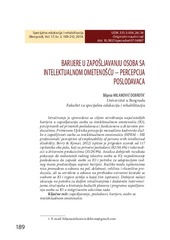Приказ основних података о документу
Barriers to employing persons with intellectual disability: Employers' perception
Barijere u zapošljavanju osoba sa intelektualnom ometenošću - percepcija poslodavaca
| dc.creator | Milanović-Dobrota, Biljana | |
| dc.date.accessioned | 2021-06-09T14:23:44Z | |
| dc.date.available | 2021-06-09T14:23:44Z | |
| dc.date.issued | 2018 | |
| dc.identifier.issn | 1452-7367 | |
| dc.identifier.uri | http://rfasper.fasper.bg.ac.rs/handle/123456789/1139 | |
| dc.description.abstract | The research was conducted with the aim to determine the most common barriers to the employment of persons with intellectual disabilities (ID), perceived by private employers and officials in state-owned enterprises. By applying HPEM - HR professionals' perception of employability of persons with intellectual disability (Berry & Kymar, 2012) an appropriate sample of 117 respondents of both genders, who were private employers (82/50.4%) and managers of state-owned enterprises (35/29.9%) was examined. Analysis of the obtained results showed that major barriers were the lack of work experience of persons with ID, the lack of stimulus for employers to hire persons with ID, and the need for workplace accommodation. The differences among respondents were not found in relation to gender, business activity, size and ownership of the company, but they were determined according to previously achieved contact with persons with ID and region of the country in which the respondents lived. The obtained findings imply the need for further research and additional interventions by experts in creating future plans and programs of employment for persons with ID in integrated working conditions. | en |
| dc.description.abstract | Istraživanje je sprovedeno sa ciljem utvrđivanja najučestalijih barijera u zapošljavanju osoba sa intelektualnom ometenošću (IO), percipiranih od privatnih poslodavaca i funkcionera u državnim preduzećima. Primenom Upitnika percepcije menadžera kadrovske službe o zapošljivosti osoba sa intelektualnom ometenošću (HPEM - HR professionals' perception of employability of persons with intellectual disability; Berry & Kymar, 2012) ispitan je prigodan uzorak od 117 ispitanika oba pola, koji su privatni poslodavci (82/50,4%) i rukovodioci u državnim preduzećima (35/29,9%). Analiza dobijenih rezultata pokazuje da nedostatak radnog iskustva osoba sa IO, nepodsticanje poslodavaca da zaposle osobe sa IO i potreba za adaptacijom radnog mesta predstavljaju najveće barijere. Razlike među ispitanicima nisu pronađene u odnosu na pol, delatnost, veličinu i vlasništvo preduzeća, ali su utvrđene u odnosu na prethodno ostvareni kontakt sa osobom sa IO i region zemlje u kojoj žive ispitanici. Dobijeni nalazi ukazuju na potrebu za daljim istraživanjima i dodatnim intervencijama stručnjaka u kreiranju budućih planova i programa zapošljavanja osoba sa IO u integrisanim uslovima rada. | sr |
| dc.publisher | Univerzitet u Beogradu - Fakultet za specijalnu edukaciju i rehabilitaciju, Beograd | |
| dc.rights | openAccess | |
| dc.rights.uri | https://creativecommons.org/licenses/by-sa/4.0/ | |
| dc.source | Specijalna edukacija i rehabilitacija | |
| dc.subject | employment | en |
| dc.subject | employers | en |
| dc.subject | barriers | en |
| dc.subject | persons with intellectual disabilities | en |
| dc.subject | zapošljavanje | sr |
| dc.subject | poslodavci | sr |
| dc.subject | barijere | sr |
| dc.subject | osobe sa intelektualnom ometenošću | sr |
| dc.title | Barriers to employing persons with intellectual disability: Employers' perception | en |
| dc.title | Barijere u zapošljavanju osoba sa intelektualnom ometenošću - percepcija poslodavaca | sr |
| dc.type | article | |
| dc.rights.license | BY-SA | |
| dc.citation.epage | 212 | |
| dc.citation.issue | 2 | |
| dc.citation.other | 17(2): 189-212 | |
| dc.citation.rank | M51 | |
| dc.citation.spage | 189 | |
| dc.citation.volume | 17 | |
| dc.identifier.doi | 10.5937/specedreh17-16987 | |
| dc.identifier.fulltext | http://rfasper.fasper.bg.ac.rs/bitstream/id/119/1136.pdf | |
| dc.identifier.scopus | 2-s2.0-85071358900 | |
| dc.type.version | publishedVersion |


